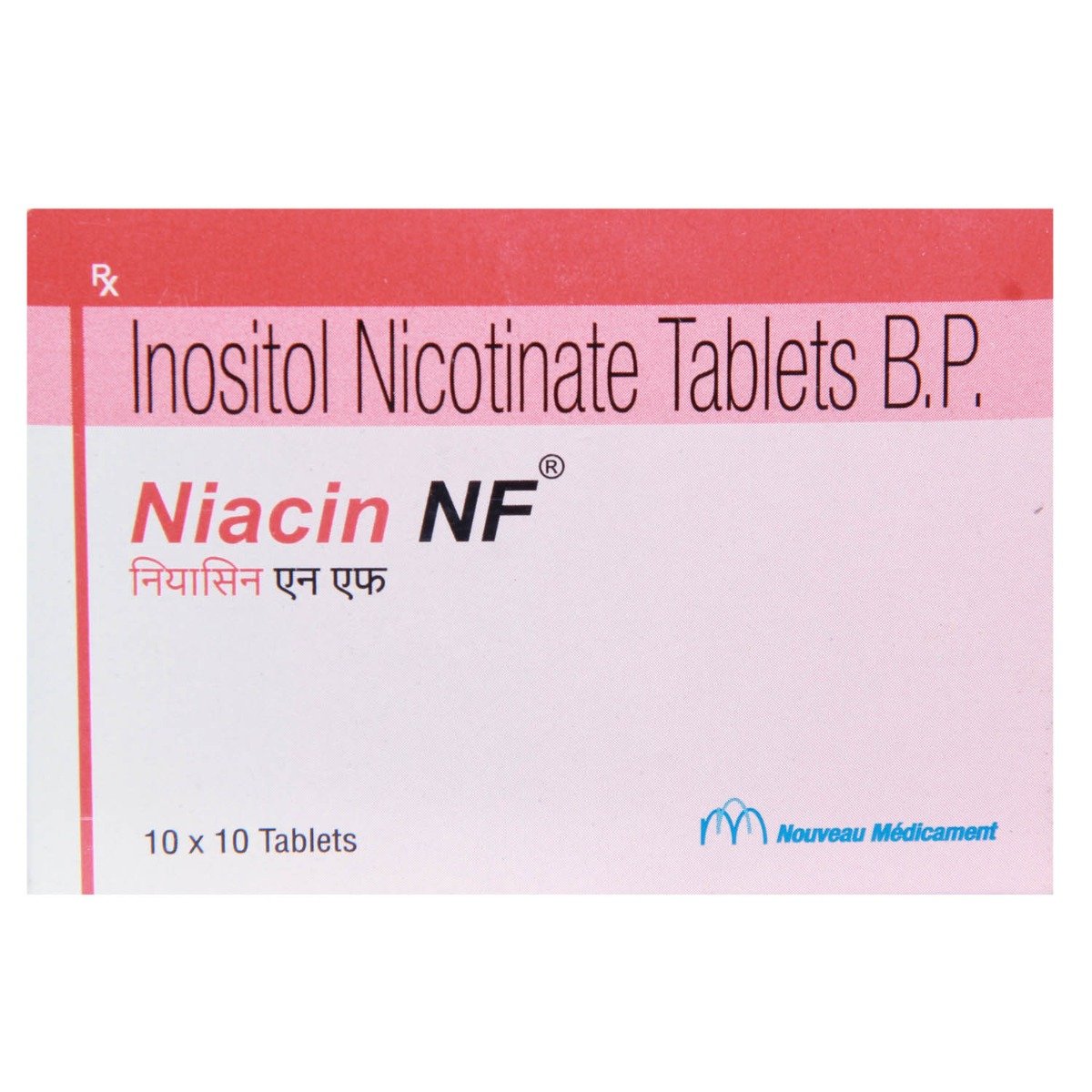Inositol Nicotinate
About Inositol Nicotinate
Inositol Nicotinate belongs to a group of medicines called vasodilators indicated for managing peripheral vascular disease. Additionally, Inositol Nicotinate may also be used to treat intermittent claudication, stasis dermatitis, Raynaud’s disease and cerebral vascular disease. Peripheral vascular disease is a blood circulation disorder that causes the blood vessels outside the brain and heart to narrow and block. The narrowed blood vessels cause reduced blood flow.
Inositol Nicotinate contains ‘Inositol nicotinate’ that dilates the blood vessels and improves blood circulation by releasing histamine and breaks up the protein required for blood clotting. Inositol Nicotinate lowers the cholesterol and triglyceride levels, thereby preventing the formation of lipids.
You are advised to take Inositol Nicotinate for as long as your doctor has prescribed it for you, depending on your medical condition. In some cases, you may experience certain common side effects such as nausea, vomiting, diarrhoea, stomach upset, and flatulence. Most of these side effects do not require medical attention and will resolve gradually over time. However, you are advised to talk to your doctor if you experience these side effects persistently.
Consult your doctor if you are pregnant or breastfeeding. Inositol Nicotinate may cause dizziness, so drive only if you are alert. Inositol Nicotinate should be given to children only if prescribed by the doctor. Avoid consuming alcohol with Inositol Nicotinate as it could lead to increased dizziness and liver problems. Keep your doctor informed about your health condition and medicines to rule out any side effects/interactions.
Uses of Inositol Nicotinate
Medicinal Benefits
Inositol Nicotinate belongs to a group of medicines called vasodilators indicated for the management of peripheral vascular disease. Inositol Nicotinate dilates the blood vessels and improves blood circulation by releasing histamine and breaks-up the protein required for blood clotting. Inositol Nicotinate lowers the cholesterol and triglyceride levels, thereby preventing the formation of lipids. Inositol Nicotinate may also be used to treat intermittent claudication, stasis dermatitis, Raynaud’s disease, and cerebral vascular disease.
Directions for Use
Storage
Side Effects of Inositol Nicotinate
- Nausea
- Vomiting
- Diarrhoea
- Stomach upset
- Flatulence
Drug Warnings
Do not take Inositol Nicotinate if you are allergic to any of its components. Inform your doctor if you have a bleeding disorder, diabetes, high blood pressure, heart disease, gall bladder disease, gout, low blood pressure, stomach ulcers, liver or kidney problems. Consult your doctor if you are pregnant or breastfeeding. Inositol Nicotinate may cause dizziness, so drive only if you are alert. Inositol Nicotinate should be given to children only if prescribed by the doctor. Avoid consuming alcohol with Inositol Nicotinate as it could lead to increased dizziness and liver problems.
Drug Interactions
Drug-Drug Interactions: Inositol Nicotinate may interact with anticoagulant drugs (clopidogrel, warfarin, heparin, dalteparin, enoxaparin, aspirin), lipid-lowering agents (atorvastatin, lovastatin, pravastatin, simvastatin), anti-diabetic (glimepiride, insulin, pioglitazone, glipizide).
Drug-Food Interactions: No interactions found/established.
Drug-Disease Interactions: Inform your doctor if you have bleeding disorder, diabetes, high blood pressure, heart disease, gall bladder disease, gout, low blood pressure, stomach ulcers, liver or kidney problems.
Drug-Drug Interactions Checker List:
Safety Advice

Alcohol
unsafeAvoid consumption of alcohol while taking Inositol Nicotinate as it may cause increased dizziness.

Pregnancy
cautionPlease consult your doctor if you have any concerns regarding this; your doctor will prescribe only if the benefits outweigh the risks.

Breast Feeding
cautionConsult your doctor before taking Inositol Nicotinate; your doctor will decide whether Inositol Nicotinate can be taken by breastfeeding mothers or not.

Driving
cautionInositol Nicotinate may cause dizziness. Do not drive or operate machinery unless you are alert.

Liver
unsafeInositol Nicotinate should not be used in patients with liver disease. Please consult your doctor if you have a liver impairment or any concerns regarding this.

Kidney
unsafeInositol Nicotinate should not be used in patients with kidney disease. Please consult your doctor if you have kidney impairment or any concerns regarding this.

Children
cautionInositol Nicotinate should not be given to children unless prescribed by the doctor.
Habit Forming
Diet & Lifestyle Advise
- Exercising regularly helps in improving overall health. Take a break between exercises if you feel uneasy. Finding the right exercise is the key.
- Rest well, get plenty of sleep.
- Take proper care of your legs and feet.
- Wear shoes that fit you well.
- Check your feet daily for any cracks or sores.
- Try to stay warm. Avoid cold temperatures.
- Avoid smoking and alcohol consumption.
- Meditation and yoga can help lower stress, decrease pain sensitivity and improves coping skills.
- Acupuncture can be helpful by stimulating pressure points.
- Using essential oils for massages can help increase circulation.
Special Advise
- Inositol Nicotinate should be stopped 2weeks prior to any surgery as it might slow down blood clotting. In case you are due to have any surgery, inform the surgeon that you are taking Inositol Nicotinate.
- Regular blood tests are advised while taking Inositol Nicotinate.
Patients Concern
Disease/Condition Glossary
Peripheral vascular disease: It is a blood circulation disorder that causes the blood vessels outside the brain and heart to narrow and block. The narrowed blood vessels cause reduced blood flow. It could occur due to the deposition of fat and calcium on the walls of the arteries. Symptoms include pain in the leg, especially while walking. Risk factors of peripheral vascular disease include smoking, ageing, and diabetes.
Intermittent claudication: Intermittent claudication, also known as vascular claudication, is a symptom in which muscle pain or mild exertion occurs during exercise. The pain is generally felt in the calf muscle. Symptoms include cramp, ache, fatigue, and numbness.
Stasis dermatitis: It is a condition in which skin inflammation occurs in the lower legs caused by fluid build-up due to circulation issues, varicose veins or heart disease. Symptoms include itching, thickened skin, ulcers, and skin discolouration of the ankles or shins.
Raynaud’s disease: In this condition, the smaller arteries that supply blood to the skin become narrow in response to cold. This causes a limited blood supply to the affected area leading to numbness. The fingers, toes, tip of the nose, and ears commonly become cool and numb in response to cold temperature.
Cerebral vascular disease: It is a condition that affects the blood vessels and blood supply to the brain. This could lead to a stroke. Symptoms include numbness/paralysis of the face, arm, leg and trouble walking, understanding, and speaking.
FAQs
Inositol Nicotinate dilates the blood vessels and improves blood circulation by releasing histamine and breaks-up the protein required for blood clotting. Inositol Nicotinate lowers the cholesterol and triglyceride levels, thereby preventing the formation of lipids.
Inositol Nicotinate might interfere with blood sugar control, thereby affecting blood glucose levels. Inform your doctor if you are diabetic; your doctor may adjust the dose accordingly. Regularly monitor blood sugar levels while taking Inositol Nicotinate.
Do not discontinue Inositol Nicotinate without consulting your doctor. To treat your condition effectually, continue taking Inositol Nicotinate for as long as prescribed. Do not be reluctant to speak with your doctor if you feel any difficulty while taking Inositol Nicotinate.
Consult your doctor before taking Inositol Nicotinate with anti-hypertensive medicines. Inositol Nicotinate might lower the blood pressure; therefore, use Inositol Nicotinate with caution if you are taking anti-hypertensive medicines. Together, they might lower blood pressure than normal. Regularly monitor blood pressure levels while taking Inositol Nicotinate.
Please consult your doctor before taking Inositol Nicotinate with statins (lipid-lowering agents) because when taken together, rhabdomyolysis (severe muscle problem) might occur.
Inositol Nicotinate should not be taken if you have peptic ulcer disease. Inositol Nicotinate breaks down in the body to release niacin which may affect the peptic ulcers. Please consult your doctor if you have any concerns regarding this.
Inositol Nicotinate might slow down the blood clotting, thereby increasing the risk of bleeding and might make bleeding disorders worse. Be cautious while using sharp objects, and consult a doctor immediately if you notice bleeding for a longer time.
Inositol Nicotinate can increase the risk of irregular heartbeat; therefore, inform your doctor before taking Inositol Nicotinate if you have heart disease such as unstable angina. Regular monitoring of heart rate is advised.








